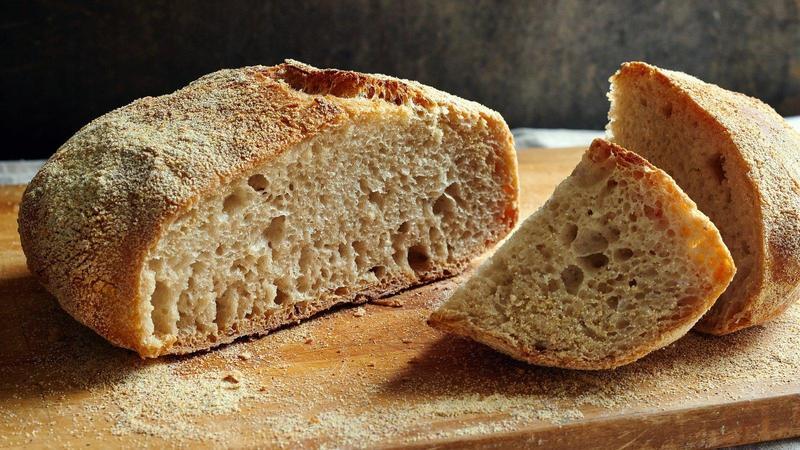Fructan, not Gluten, is What Upsets People's Stomachs, New Study Finds
Fructan, not Gluten, is What Upsets People's Stomachs, New Study Finds
A team of researchers with several members from the University of Oslo in Norway and one with Monash University in Australia has found that the familiar bloating many people experience after eating foods containing wheat may be due to sensitivity to fructan, not gluten, as is commonly believed. In their paper published in the journal Gastroenterology, the group describes experiments they conducted with volunteers eating foods with and without fructan and gluten and what they found.
Having a sensitivity to gluten has become a trend of sorts—some people (as much as 13 percent of the population) experience bloating after eating foods that contain it, and because of that, seek foods such as gluten-free bread and pasta that are just as good. But now, it appears the blame for such bloating might be misplaced. Instead of looking for gluten-free foods, people many soon be looking for fructan-free foods.
Fructan is a type of carbohydrate found in wheat and also in other foods such as onions, garlic and some other vegetables. Prior research has found a possible link between fructan and symptoms of irritable bowel syndrome. Because of that, the researchers wondered if it might be behind some other less-problematic digestive problems. To find out, they enlisted the assistance of 59 people who had self-diagnosed themselves with gluten intolerance—each was given muesli bars to eat over the course of several weeks and to write down any symptoms they experienced. Some of the bars had gluten, some had fructan and some had neither.
Afterward, the researchers studied the records kept by the volunteers and found that they experienced the familiar bloating only when eating the bars with fructan—they were fine when eating the controls and the bars with gluten. This, the researchers contend, suggests that it is fructan, not gluten that is causing widespread bowel problems. This is an important distinction, they also note, because some recent research has found that people who put themselves on a gluten-free diet may be at an increased risk of developing type 2 diabetes.
More information: Gry I. Skodje et al. Fructan, Rather Than Gluten, Induces Symptoms in Patients With Self-reported Non-celiac Gluten Sensitivity, Gastroenterology (2017).
DOI: 10.1053/j.gastro.2017.10.040
Abstract
Background & Aims
Non-celiac gluten sensitivity is characterized by symptom improvement after gluten withdrawal in absence of celiac disease. The mechanisms of non-celiac gluten sensitivity are unclear, and there are no biomarkers for this disorder. Foods with gluten often contain fructans, a type of fermentable oligo-, di-, monosaccharides and polyols. We aimed to investigate the effect of gluten and fructans separately in individuals with self-reported gluten sensitivity.
Methods
We performed a double-blind crossover challenge of 59 individuals on a self-instituted gluten-free diet, for whom celiac disease had been excluded. The study was performed at Oslo University Hospital in Norway from October 2014 through May 2016. Participants were randomly assigned to groups placed on diets containing gluten (5.7 g), fructans (2.1 g), or placebo, concealed in muesli bars, for 7 days. Following a minimum 7-day washout period (until the symptoms induced by the previous challenge were resolved), participants crossed over into a different group, until they completed all 3 challenges (gluten, fructan, and placebo). Symptoms were measured by gastrointestinal symptom rating scale irritable bowel syndrome (GSRS-IBS) version. A linear mixed model for analysis was used.
Results
Overall GSRS-IBS scores differed significantly during gluten, fructan, and placebo challenges; mean values were 33.1±13.3, 38.6±12.3, and 34.3±13.9, respectively (P = .04). Mean scores for GSRS bloating were 9.3±3.5, 11.6±3.5, and 10.1±3.7, respectively, during the gluten, fructan, and placebo challenges (P = .004). The overall GSRS-IBS score for participants consuming fructans was significantly higher than for participants consuming gluten (P = .049), as was the GSRS bloating score (P = .003). Thirteen participants had the highest overall GSRS-IBS score after consuming gluten, 24 had the highest score after consuming fructan, and 22 had the highest score after consuming placebo. There was no difference in GSRS-IBS scores between gluten and placebo groups.
Conclusions
In a randomized, double-blind, placebo-controlled crossover study of individuals with self-reported non-celiac gluten sensitivity, we found fructans to induce symptoms, measured by the gastrointestinal symptom rating scale irritable bowel syndrome version. Clinicaltrials.gov no: NCT02464150
Be the first to post a message!
